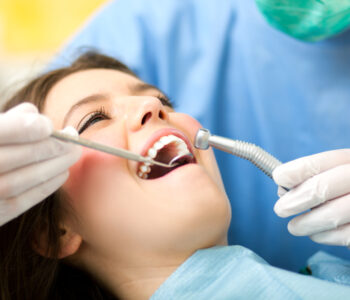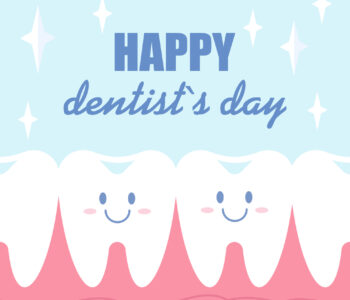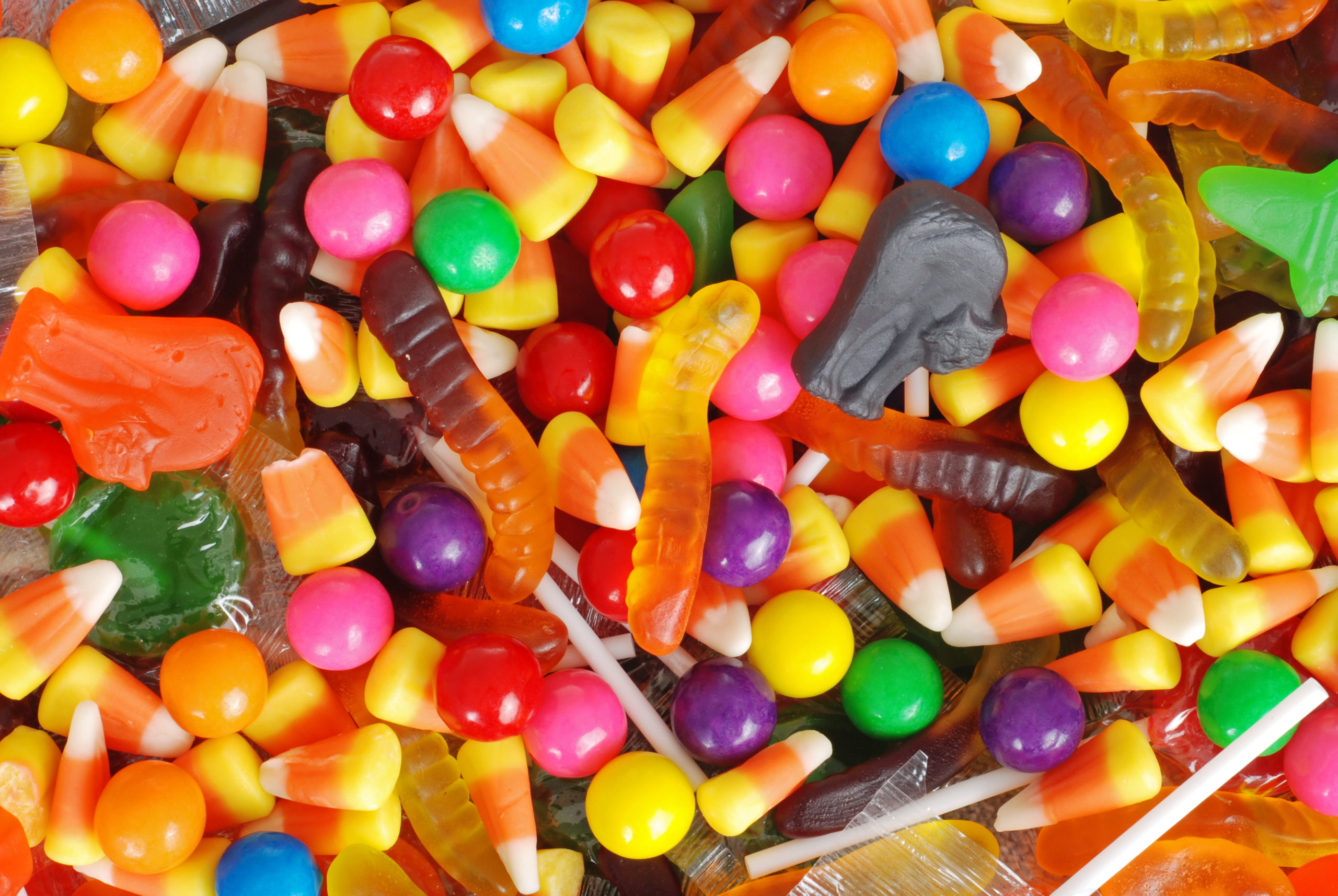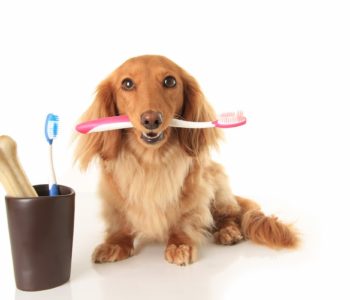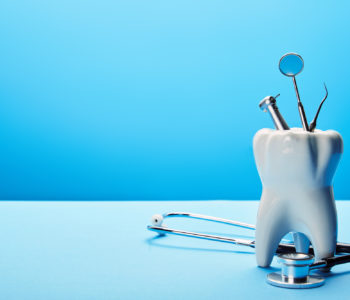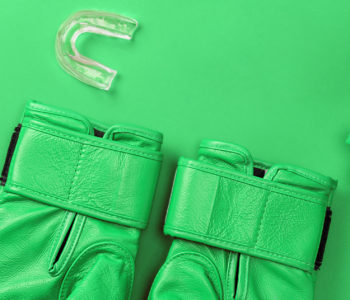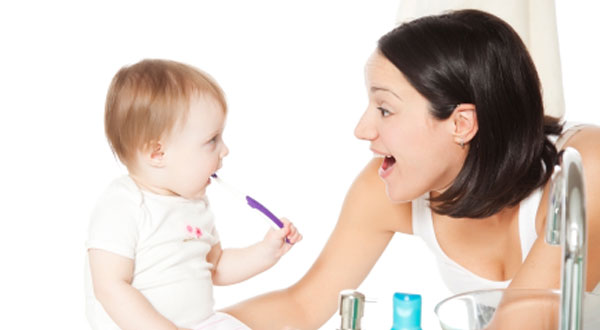 Dental Health
Dental Health
Your Baby’s First Visit to the Dentist
Having a new baby is a wild ride marked by a series of firsts – little signposts signaling their development and growth. First steps, first word, first solid food – there’s a host of moments to remember and celebrate. But, in all the excitement of these fledgling accomplishments, one important first is often overlooked – or, at best, delayed.
A baby’s first visit to the dentist is something that far too many parents put off for far too long. Is it because of their own dental anxieties or maybe lack of sleep and cloudy thinking? More likely, parents fail to schedule their babies’ first visit to the dentist because they don’t understand or recognize its importance. After all, those baby teeth are eventually going to fall out and be replaced by primary teeth, right? So, what’s the big deal?
Set the Stage for Success
Sure, we all know that baby teeth – officially referred to as primary teeth – are going to fall out, or shed, sooner than later. The trouble is, it’s not necessarily as soon as we think. And, it’s certainly not soon enough to avoid developing bad dental habits and compromise oral hygiene. Primary teeth are like seat savers. They save the spot, so to speak, for permanent teeth, which are already beginning to form under the jawline. Imagine you’re a primary tooth…who’s seat would you rather take when it’s your turn – someone like the Peanuts’ character, Pig Pen or Mr. Clean?
Primary teeth are predictors of the health and condition of permanent teeth, so you want your child’s primary teeth to be well cared for right away.
When to Schedule Your Baby’s First Dental Appointment
When babies are born, they already have 20 primary teeth growing within their gums. Most parents can expect to see their babies’ first four primary teeth – two on the front upper gum line, and two on the front lower gum line, between six and twelve months. In general, all 20 primary teeth will have “erupted” by a child’s third year.
All kids are different, of course, and primary teeth come in at different ages. For instance, a first molar might appear anywhere between 13-19 months of age, which will then fall out or “shed” somewhere between ages 9-11 years.
This is why it’s crucial to have your baby see the dentist as soon as those primary teeth start to show. In other words, you’ll want to schedule that first visit to the dentist by six months, and before your baby reaches his or her first birthday. Both the American Dental Association and the American Academy of Pediatric Dentistry agree that the best time to schedule a baby’s first dental appointment is within six months after a first tooth appears, but well before one year of age.
But why?
After all, those puny primary teeth are only going to be replaced by permanent teeth, so why all the fuss?
Primary Teeth Are Not Immune to Decay
As shown in this graphic, primary teeth do not shed for some time and their overall condition can be a predictor of how healthy your child’s permanent teeth will be.
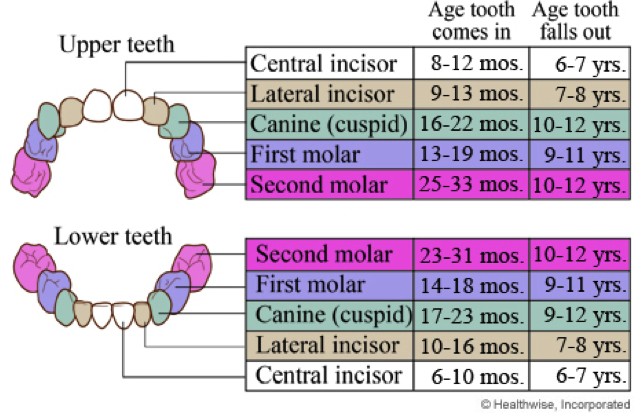
Primary teeth suffer tooth decay, just like permanent teeth do. When naturally occurring oral bacteria convert food and liquids to acid, that acid can work on your teeth for at least 20 minutes. If you don’t properly care for your teeth by avoiding sugary snacks and beverages, brushing and flossing regularly, and maintaining routine dental check-ups – that acid will linger, turn to decay, and inevitably present as cavities.
This is why dentists caution parents against putting their babies in cribs or bassinets with a bottle. Milk, or any liquid, will collect around the teeth and gum line while the baby is sleeping, allowing too much time for decay to develop. For this same reason, dentists advise the avoidance of sugary snacks and drinks.
The Perfect Time to Introduce Your Baby to the Dentist
As soon as those little primary teeth start to show, it’s time to bring your baby to his or her very first dental appointment. In order to have the most successful visit possible, you will want to consider the timing. Don’t wait until there is an issue that requires a visit to your dentist. Instead, schedule a well-baby appointment, just as you would with your child’s pediatrician.
Whether you love the dentist or harbor anxiety over your own dental appointments because your childhood dentist too closely resembled Little Shop of Horror’s Orin Scrivello, DDS, it’s crucial that you remain positive. Positivity surrounding your child’s first (and subsequent) visit to the dentist will help ensure that your child doesn’t latch onto and develop any unnecessary angst about the dentist, or good oral hygiene in general.
We all know that kids are unpredictable, but you want to do your best to schedule an appointment when your baby is well rested and at his or her best. Trying to squeeze in an appointment right before naptime, for example, might not bode well. Think of this appointment as more than a single event. Use this time to establish your “dental home base,” a reliable and welcoming environment where you will return year after year with your child. This allows your dentist to get to know you, your baby, your family, and understand everyone’s needs as they develop.
What to Expect at Your Baby’s First Visit
During this first visit to the dentist, you can expect your dentist to check your baby’s teeth for any signs of decay. Parents will be introduced to best practices for caring for their baby’s teeth, including possible recommendations for optimal, age-appropriate oral hygiene products, along with suggestions regarding dietary needs.
As your baby grows into a toddler, these visits might require a tooth cleaning, depending on the condition of the teeth, along with suggestions for fluoride treatments or dental sealants – two methods to help prevent cavities. If your child is a thumb-sucker, your dentist will address issues that may develop as a result of the habit, and advise ways to break it so that your child’s teeth grow in properly.
Mark the Baby Book of Firsts
For those of you journaling moms and dads, add baby’s first dentist appointment to your chronicling efforts. Mark the calendar around six months and keep a close watch on those primary teeth as they arrive. Make sure – no matter when those primary teeth do appear – that you’ve established a relationship with a dental practice that you can count on. Schedule that first visit before baby’s first birthday and let your trusted dentist take care of the rest.

